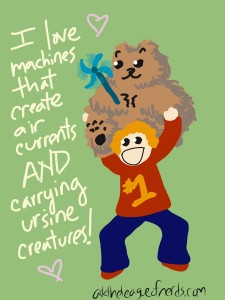Dear Language Nerd,
So here’s my crossword puzzle clue: “Address letters.” And I’m racking my brain – issue invitations? Write out? Inscribe? Engrave? Calligraphize? And then (much later) I realize. “Address” is a NOUN, not a verb, and the answer is the 2-letter state code. Tell me with linguistics the mechanisms of this trickery, o nerdy one!
-FDR
***
Dear FDR,
This, sir or madam, is a nefarious cocktail of polysemy and collocation. Which sounds a lot dirtier than it is.
I doubt that you learned about polysemes in elementary school, but you likely studied their close cousins, homonyms. As you may recall from dim memories of third grade, homonyms are words that are spelled the same and pronounced the same, but have different meanings. “Fan” as in thing that moves air and “fan” as in enthusiast, for example, or “bear” the big furry creature and “bear” like carry a weight (such as a big furry creature).
Polysemes are very similar: same spelling, same pronunciation, different meanings. The distinction is that homonyms’ meanings are completely different, while with polysemes the connection between the two meanings is obvious. So “light” meaning “brightness” and “light” meaning “not heavy” are homonyms; but “light” meaning “brightness” and “light” meaning “put a flame to a candle” are polysemes. Are the “brightness”/”not heavy” senses related, and if so, how? Without a good etymology dictionary, I have no idea. But “light a candle” is clearly “get the candle to emit light.”
Polysemes come from the natural extension of an already extant word – a noun becomes a verb meaning to get or do that noun, say, or a verb becomes a noun showing the result of that verb. Homonyms have slightly trickier histories. They can be sheer coincidence – “key” (in a lock) is Germanic, “key” (an island) is from Spanish, and their current matching forms are straight-up chance. More intriguing, two words can start out as polysemes and then drift apart, until the meanings are so disparate that we no longer recognize the connection. It made sense (back in the day) to call the bow of a ship the “head” – the important part, the front, sure. And then it made sense to call a ship’s toilet* the “head,” too, since it was located in the head of the ship. But now that the middle sense is lost, the chain connecting “head” the toilet and “head” the brain-holder is broken, and the two are homonyms. In these cases, exactly when polysemes become homonyms is a bit of a judgment call.
Now when the shadow-cloaked cabal of crossword-puzzle makers sits down to work their dark art, polysemes and homonyms are among their most dependable tools for confounding the erstwhile player. But how do they ensure that, as in your case, it will be the wrong sense of the word that leaps to the forefront of the player’s mind, securing the suffering and anguish they so desire? Collocation.
A collocation is a few words that tend to go together. Not set in stone, and not idiomatic enough to be a phrase, just usually end up together. We “make the bed” and “do our homework” – “make” collocates with “bed,” and “do” with “homework,” not the other way around. “Birthday” collocates with “song” and “party,” “sad” collocates with “song” and “face.” They hang out together.
In a crossword, clues are written so that the collocations will send our brains zooming off in the wrong direction. “Address letters” is a pretty common collocation in the sense of “write out where someone lives on the envelope”; you don’t usually hear the state codes referred to that way. The trick, of course, is to never take a clue at face value, and to hunt through the various applicable polysemes and homonyms until the answer presents itself.
Or shriek in frustration and cancel your subscription.
And they say the internet is killing newspapers.
Yours,
The Language Nerd
*Can’t believe I didn’t think of this back when I wrote about lavatories!
Got a language question? Ask the Language Nerd! asktheleagueofnerds@gmail.com
Twitter @AskTheLeague / facebook.com/asktheleagueofnerds
One source this time: Etymonline. Hononymy, polysemy, and their ilk are fundamental aspects of semantics, the study of meanings. “Collocation” oddly enough, I never heard of while getting my linguistics degree; but dang, is it ever important for teaching English as a second language.
